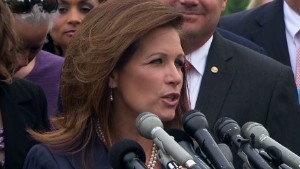Editor's note: Christopher Parker is the Stuart A. Scheingold Professor of Social Justice and Political Science at the University of Washington, Seattle. His new book, with Matt Barreto, is "Change They Can't Believe In: The Tea Party and Reactionary Politics in America." He is also the author of "Fighting for Democracy: Black Veterans and the Struggle Against White Supremacy in the Postwar South."
(CNN) -- After the tea party's poor showing in the 2012 elections, many in the political world declared the movement dead. After all, it had lost one-sixth of its members in Congress and at least two Senate seats by running questionable candidates. Plus, the tea party didn't get its way on the debt ceiling, and the Paul Ryan budget failed to get much traction.
Recent CNN polls, however, suggest that gaffes by the Obama administration are breathing new life into the tea party movement. In a CNN poll conducted in March, 28% of the voting-age public supported the tea party. Now, however, in the wake of the recent controversies involving the administration -- especially the one about the Internal Revenue Service -- support is on the rise. According to a CNN poll released May 20, 37% of the public now supports the movement, a level that approaches the high-water mark the tea party achieved in 2010.
 Christopher S. Parker
Christopher S. Parker Why the increase in popularity? It's simple: The IRS scandal resonates with the tea party faithful because it fits so well the meme the movement has pushed since the early days of the administration: An Obama-led government is too big, too fiscally irresponsible.
First, there was the movement's resistance to the stimulus package, claiming the government spent too much to revive the economy. Then, of course, was the tea party's opposition to health care reform: Again, government had grown too big, spending excessively. And that some people would be forced by the government to purchase insurance or else face a tax, for tea partiers, was further proof of Obama-led governmental tyranny. Now, the IRS scandal permits the tea party to highlight how the administration is overreaching and meddling in the lives of Americans.
But here's the thing: Most political scandals don't last very long. Those involving the president, or officials in his administration, tend to have a shelf life of six months. As it stands, we're not even six months beyond the most recent election cycle. So the likelihood that the tea party -- and therefore Republicans -- can leverage the recent scandals to their political advantage isn't great if the next election cycle (2014) is the target.
If the tea party and Republicans wish to make political hay that will carry them through 2014, they must return their gaze to the substantive policy issues that tend to mobilize their supporters: Immigration reform and same-sex marriage are two examples. Indeed, opposition to immigrant rights and same-sex rights has proven effective for rallying the base.
 Bachmann: IRS controversy 'troubling'
Bachmann: IRS controversy 'troubling'  IRS admits it targeted tea party groups
IRS admits it targeted tea party groups The problem is that if the tea party returns to issues proven to fire up the base it will violate at least two of its major tenets: fiscal prudence and smaller government. For instance, the tea party's position on immigration reform would increase government spending to the tune of $28 billion per year to secure the border. In the case of same-sex rights, the state is called upon to regulate marriage. This would seem to contradict the tea party's claim that it's all about fiscal prudence and small government.
How can this be? In other words, how can the tea party and its supporters favor small and large government? The paradox is easily resolved once we consider the motives of many tea party supporters. They see America changing too rapidly, both demographically and culturally. American identity is generally identified as white and heterosexual, among other things. Thus, it shouldn't come as a shock that despite their declared preference for small government, many in the tea party embrace big government when necessary. It's perhaps the most effective way to police what they perceive as encroachments upon the "American" way of life in which white racial identity and heterosexuality remain the norm. Like American reactionary movements of the past, the tea party resists change of any kind.
For tea party loyalists, the long and short of it is as follows. In President Barack Obama's first term, the government spent too much; so far, in his second, the government is meddling too much. The problem for the tea party is that the benefits extracted from these missteps will likely be short-lived, certainly not enough to last until the next election cycle.
Isn't it ironic that to sustain support through 2014, and to have a shot at the White House, the tea party will have to push policy solutions to important issues that rely upon bigger -- not smaller -- government?
Follow us on Twitter @CNNOpinion.
Join us on Facebook/CNNOpinion.
{ 0 comments... read them below or add one }
Post a Comment